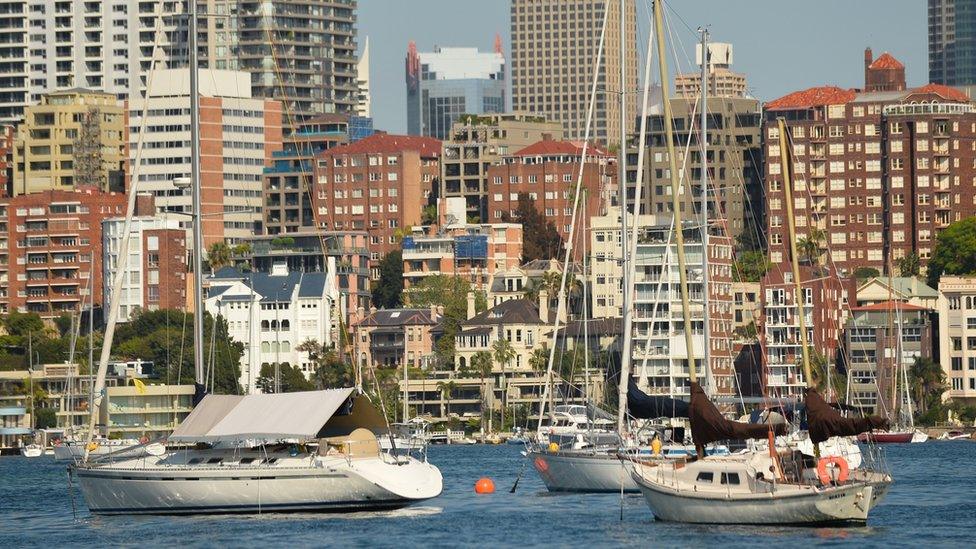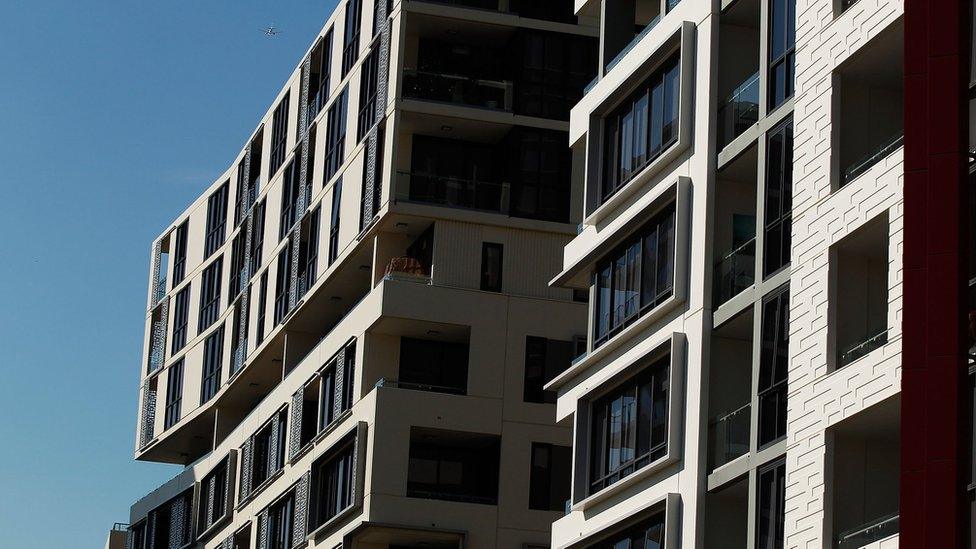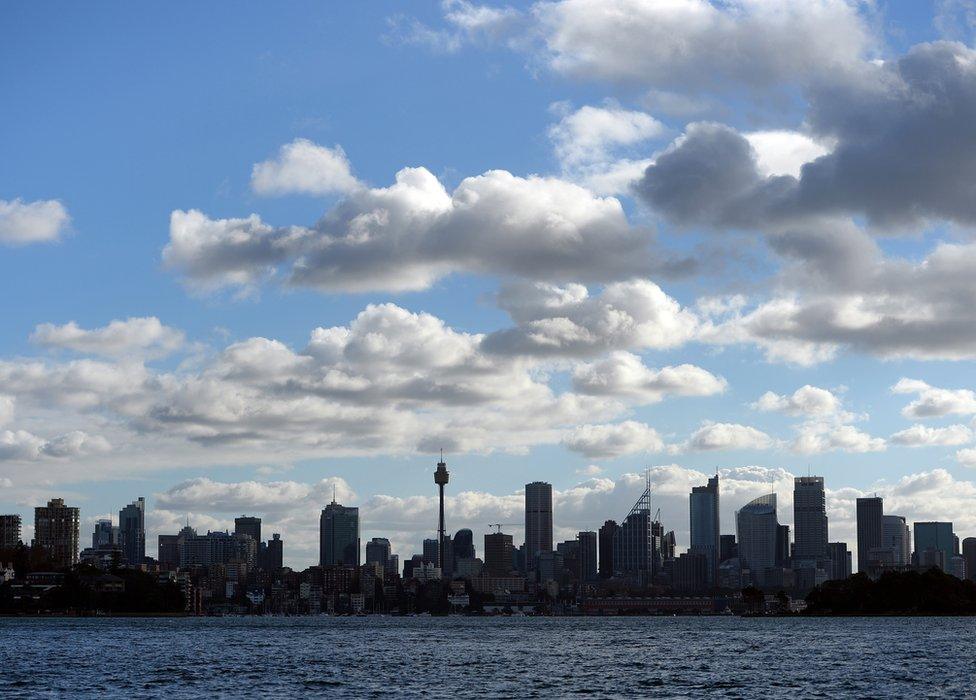Is Sydney really in the grip of a housing bubble?
- Published

Buying a home on Sydney's glittering harbour is out of reach for most
Sydney's sky-high property market has spawned doomsday predictions of a housing bubble on the verge of collapse. But is a "bloodbath" inevitable, asks Ian Lloyd Neubauer.
Bidders slugging it out for a A$1.7m (£1.02m; $1.28m) shed. An apartment bought for A$750,000 in 2015 selling for A$1,08m this year. Neighbours quadrupling the value of their homes by banding together to sell their land in one transaction to developers with pockets that are hundreds of millions of dollars deep.
Welcome to Sydney, the glittering coastal city built around a blue-water harbour where the median price of a house is more than A$1m. Good value? For those who can afford it. Sydney is after all the financial capital of a country enjoying a record 26-year economic dream run; a clean, safe and well-managed city with a mild climate and world-famous beaches.
"We've seen some crazy results," says Hannan Bouskila, an agent with Raine & Horne Bondi Beach who recently sold the same property for the fifth time in eight years - a beachside studio that fetched A$461,000 in 2009, A$525,000 in 2011, A$610,000 in 2013, A$750,000 in 2015 and A$860,000 this year.
"It's one of the best markets I've ever worked in," he says.
Bubbles?
But is the market stable? Not according to the tellingly named UBS Housing Bubble Index. Released in September, it named Sydney the fourth most likely city in the world to face a housing correction. The most bubbly city on the list, Vancouver, has already seen a significant albeit tax-driven correction of 18%-20%.
Sydney has the second most unaffordable property market in the world after Hong Kong in the Demographia International Housing Affordability Survey, with the price of a typical home now costing 12.2 times the annual pre-tax income of an ordinary household.
Add a construction boom that is seeing residential towers mushroom throughout the city, and you enter bubble territory - an economic phenomenon where price ranges for assets deviate strongly from their intrinsic value.
"We have 300 cranes in the sky over Sydney building new apartments. I don't think there's a city in the word aside from Dubai with more cranes," says Lindsay David, co-founder of LF Economics and author of Australia: Boom to Bust.
"The cracks are going to start to appear next year, once all these new dwellings under construction in Sydney, Melbourne and Brisbane come online and there won't be anyone to rent them. It's going to get messy," he says, predicting a bloodbath by 2017.

Residential towers continue to pop up, fuelling bubble fears
David's position is grounded in the study of price-to-rent and wage-to-rent ratios. Property prices in Sydney have increased by 45% since 2012, while rents and wages are growing at their weakest rates in a decade. "That's the smoking gun," he says. "Under any mathematical account, it's a credit-fuelled housing bubble."
But David is also one in a long line of experts armed with solid economic methodology who've bet wrongly against Sydney's housing market in recent years.
In February, US hedge-fund consultant Jonathan Tepper - the finance wizard who predicted mortgage bursts in the US, Spain and Ireland - visited Sydney on a highly publicised and highly peculiar fact-finding tour.
Posing as one-half of a gay couple who drove around the city pretending to shop for multi-million homes, he claims to have fielded offers of easy finance from mortgage brokers willing to lend him 10 times the size of his declared salary.
Tepper's diagnosis: the bubble would burst in 2016, with a correction of 30%-50%. "Australia now has one of the biggest housing bubbles in history," Tepper said at the time, adding that anyone who disagreed with him was "brain dead".
Contacted this month to see why his claim failed to materialise, Tepper went mum. "I try not to speak to the press in general," he said. "It does very little for our business."
Demand and supply
So won't Sydney's bubble - if it even is a bubble - burst? According to Danny Avidan, a developer who sold A$36m worth of property within a few hours when his latest project, a residential tower in the beachside suburb of Bronte, went on sale on 2 November - it comes down to demand and supply.
"Yes, prices have gone through the roof," Avidan admits.
"But I can tell you we are not in a bubble for a few fundamental reasons and one of them is that we have a population projected to increase from 4.5 to 6.5 million in 20 years," he says, citing Department Planning and Environment figures that also forecasts the city requiring 726,000 new dwellings in the same period - the equivalent of 36,300 new units each year.
"Right now in Sydney we have an undersupply of 100,000 dwellings and we're only constructing 10,000 per annum." He adds: "And of course, interest rates are low, which is fuelling demand."

A typical Sydney home costs 12.2 times the annual income of an ordinary household
Not just fuelling... interest rates have turbo-charged demand. In June this year, the Reserve Bank of Australia slashed the official cash rate to a record low of 1.5% to make it cheaper for businesses to borrow and boost economic growth.
The policy is working but has a bad side-effect: it makes home loans dirt cheap too, which in turn encourages buyers to splash out at auctions. Right now, variable mortgage loans are being offered for less than 4% in Australia. This is well below the historical average rate of 7% and the nightmarish 17% the country experienced during the 1989-1990 recession.
"Money is cheap and the results are a dream," says Bouskila of Raine & Horne on Bondi Beach. "Do I call it a bubble? No, because for me, economic bubbles take place in relatively short periods of time. But these increases have been going on for at least three years."
'Nuanced' situation
This month, the 'B' word made headlines yet again when SQM Research released a report saying housing in Sydney was overvalued by 40%. "The Reserve Bank need to take tougher action if they want to avoid a housing bubble," SQM's Louis Christopher said, predicting a "possible correction" for 2018.
When grilled at a Senate estimates hearing last month, Wayne Byres, chairman of APRA (Australian Prudential Regulation Authority), Australia's powerful banking regulator, said such reports are misleading.
"I deliberately avoid using the 'B' word," Byres said.
"I think it simplifies the debate somewhat because it leads people either to say, 'We are,' in which case we are all ruined, or to say, 'We're not,' in which case, 'She'll be right.' In fact, the situation is far more nuanced than that."
But for Avidan and tens of thousands of other developers, investors, renovators, tradespeople and everyday homeowners who've gotten rich off the Sydney market, there is no nuance; there's just right or wrong.
"All these economists who have predicted a crash in Sydney for so many years, well, the fact that they've been doing it for so so long tells us they simply don't know," Avidan says.
"They are simply making intelligent guesses."